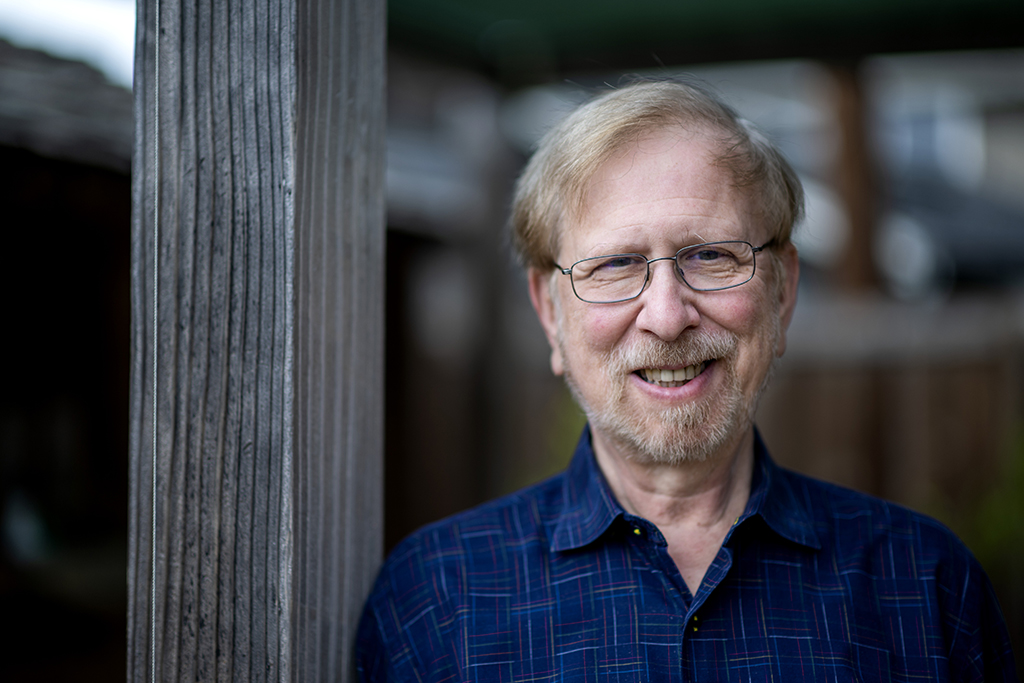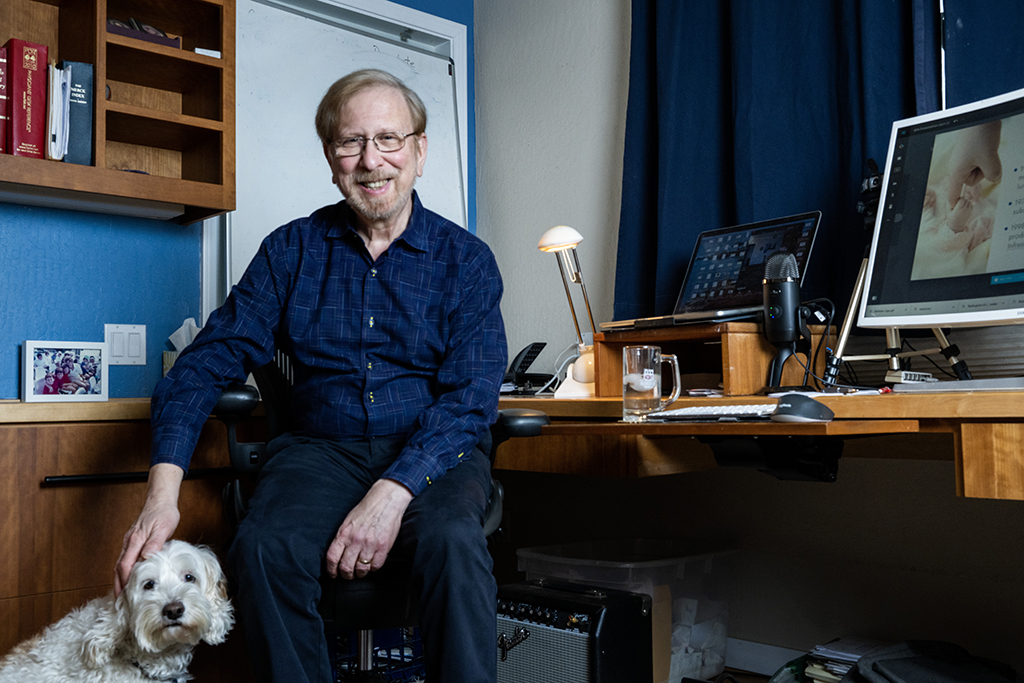Funded by multiple grants, alum Russ Lehrman (PhD ‘81) is developing a new therapeutic to revolutionize pulmonary care, starting with preterm infants
Guest Post By Brianna Foth
Respiratory disease and related complications are a leading cause of illness and death in the United States, collectively costing the health system more than $170 billion annually. Respiratory disease poses a particularly serious threat to newborn babies, especially those born prematurely. For example, respiratory distress syndrome (RDS), a breathing disorder caused by immature lungs, occurs in about 60,000 infants born in the United States each year and accounted for more than 2 percent of infant deaths in 2019.
For Russ Lehrman (PhD ‘81) — president and founder of BioSuperior Technology, a preclinical stage biotherapeutics company — the impact of respiratory disease was not fully apparent until it impacted his own family.
“I first became in touch with respiratory disease as a major health problem when my mother-in-law passed away at 57 due to acute respiratory distress syndrome,” says Lehrman, a graduate of the University of Wisconsin–Madison School of Pharmacy’s Pharmaceutical Sciences PhD program. “Later, my nephew was born prematurely and was immediately diagnosed with RDS. Both events caused me to look closely at the causes of these diseases and their overall impact.”

So, when his company received an I-Corps grant from the National Science Foundation (NSF), a program intended to help scientific entrepreneurs test product concepts with potential customers, he and colleagues met with clinicians, hospital administrators, and others to determine what new treatments would have the most impact.
“It was through these conversations that we identified that we have a tremendous opportunity to improve the standard of care in respiratory medicine that is well-suited to our skills — most immediately in preterm babies,” he says.
Since then, supported by grants from the NSF and March of Dimes, BioSuperior has been developing a novel therapeutic based on a bio-engineered lung surfactant to prevent bronchopulmonary dysplasia (BPD) in premature infants.
“The fact that these organizations agree with our ideas enough to fund the work is gratifying,” says Lehrman. “We will use these funds to achieve our next product development milestones leading to clinical trials.”
But the exciting progress that BioSuperior has made is only the latest success in Lehrman’s long and eventful career journey since graduating from the School, which has included drug development positions at several big players in the pharmaceutical industry.
“While at Wisconsin, I thought that I would become a medicinal chemistry professor working at a university,” Lehrman says. “I never imagined that I would eventually become a biotech entrepreneur.”
A non-linear path
Though Lehrman has focused on drug development for the duration of his career, before he entered college, he wasn’t sure exactly what he wanted to do.
“I had a lot of fun studying high school chemistry but grew up in a family that was most comfortable talking about politics, history, and music,” he says. “So, shortly before graduating, I asked my favorite high school teacher if she thought I should study chemistry or political science in college. She emphatically said ‘chemistry!’ That sealed the deal.”
After graduating with a bachelor’s degree in chemistry from McGill University in Montreal, Canada, Lehrman found himself drawn to the UW–Madison School of Pharmacy through an unusual, but meaningful, connection.
“A friend who was a graduate student at the University of Rhode Island School of Pharmacy introduced me to several of her post-doc friends — one of them absolutely insisted that I introduce myself to Dr. Dan Rich at the University of Wisconsin,” Lehrman says. “So even though it was early March and winter was not quite over, I drove directly from Kingston, R.I. to Madison. On a Sunday morning, I called Dr. Rich’s office number. I was going to leave a voicemail, but to my surprise, Dr. Rich answered the phone. We met that afternoon — he was clearly smart and energetic, the kind of person who could be a great mentor. I applied to the program and started the following fall.”
After graduating from the School, Lehrman joined a lab in the National Institutes of Health (NIH) that was working collaboratively with Hoffmann-La Roche on transforming growth factor beta.
“As part of the collaboration, I brought a sample to Roche so we could perform chemical analyses not available to us at NIH. The experience was life-changing. The atmosphere at Roche was electric — intensely scientific and collaborative,” Lehrman says. “From then on it was obvious to me that I would be an industrial scientist.”
He went on to perform important roles at many different companies in the pharmaceutical industry — first at Upjohn, then as director of analytical chemistry at NeXstar, a senior scientist at Nektar, and finally a director of formulation development at Elan. In 2017, he founded BioSuperior.
“Wherever I have worked – Upjohn, NeXstar, Nektar, Elan, and now BioSuperior — I have created internal organizations and technologies that have been needed for the development of novel therapeutics,” says Lehrman. “I am particularly proud of my work to help stabilize Macugen, the first therapeutic for treating adult macular degeneration. And I am proud of the progress that we have made toward developing a first-in-class therapeutic for treating pre-term respiratory illness.”
Improving neonatal respiratory care
RDS is a serious disease that occurs in preterm newborns because their lungs are too immature to manufacture pulmonary surfactant, a key biomaterial that is essential for breathing. In many cases their lungs become inflamed, which leads to BPD. This disease affects about 15,000 newborns in the United States each year and can lead to further developmental and health issues, such as delayed speech, pulmonary hypertension, and heart defects.

“The impact of BPD on both the health of individual babies and hospitals is dramatic and often lethal,” says Lehrman. “The survivors typically require significant physical therapy, occupational therapy, and other interventions, which I’ve become familiar with through conversations with patient advocacy groups and parents of babies who have been diagnosed with BPD. Often, they are readmitted back into the hospital as well, which places further burden on the families.”
In 1980, researchers discovered that babies with RDS could be treated with animal-derived lung surfactant. While surfactant obtained from animal tissue improves outcomes, these products are less effective than natural lung surfactant, are difficult to scale, and can be contaminated with animal pathogens.
“We see a strong need for a more effective synthetic lung surfactant,” says Lehrman. “Biotech has historically followed this path. We used to get our insulin from pigs, but now, it’s entirely made recombinantly. It’s the same for human growth hormone — it was initially obtained from human pituitary tissues — it is now produced recombinantly. While others have preceded us in trying to make synthetic lung surfactant, these products have been relatively ineffective compared with animal-derived products.”
After a year and a half of research, Lehrman and his team have identified an effective synthetic lung surfactant. It is now in animal testing, and they hope to be ready for first-in-human clinical trials in 2024.
“We know we can have an important impact by developing a meaningful therapeutic for BPD,” says Lehrman. “Making a drug that will impact the lives of these babies — it’s unbelievably motivating.”
Looking ahead
Although he’s focused on getting BioSuperior’s surfactant ready for the clinical trial development — the next step will be to file an Investigational New Drug application with the U.S. Food and Drug Administration (FDA) — Lehrman is also excited about the potential applicability of his technology to treat other respiratory illnesses.
“While we are entirely focused on the development of our treatment for BPD, the technology is at its core a drug delivery platform,” says Lehrman. “So, ultimately, we expect to develop a pipeline of potent lung therapeutics for the treatment of diseases such as adenocarcinoma, idiopathic pulmonary fibrosis, pulmonary arterial hypertension, and more.”
“Making a drug that will impact the lives of these babies — it’s unbelievably motivating.“
—Russ Lehrman
But for now, he says, they will focus on developing this potent, life-saving medication for infants who might otherwise not survive or have life-long disability due to serious lung inflammation.
“The mission of creating first-in-class medications for the treatment of this disease is more than enough to keep us motivated,” he says. “At this time, we have our sights set on BPD — a rare disease. But ultimately, because of the properties of our synthetic biomaterial, our vision is to have broad impact on respiratory health.”
Reproduced with permission from the University of Wisconsin–Madison School of Pharmacy
Disclaimer: The opinions expressed in this blog are those of the authors and do not represent the views and opinions of RedCrow or its affiliates. The blog does not imply a recommendation or endorsement by Redcrow. RedCrow does not verify or establish the truth of the information obtained in the blog. These materials may not be relied upon for making any investment decision. Nothing in the blog is to be construed as a securities offering.



















